Rules applied to hunting field conditions are merely applied common sense and applied politeness. Most people who break them do so either through ignorance or lack of control of their horses. The following is a list of rules which we expect everyone to faithfully adhere to when hunting with the Tryon Hounds.
- Since hunting is in both Polk County, North Carolina, and Spartanburg County, South Carolina, It is necessary for all who ride with the Hunt to obtain hunting licenses from both states.
- A negative Coggins is required for each hunt horse.
- Each rider must sign a release of liability obtainable from the Tryon Hounds website before hunting. This release will cover all hunts in the future.
- At the beginning of each Hunt, the rider should appear properly dressed with clean tack as well as clean horse.
- No smoking in the hunt field.
- The Field is a place for avid foxhunters who are interested in watching hounds work. Total attention to the hunt is required. Conversation and needless talk can be a distraction and a deterrent to good foxhunting. Quiet is important.
- The use of portable telephones in the hunt field is inappropriate.
- To prevent your horse from kicking a hound, turn your horse’s head toward passing hounds when you are standing. Give way as much as possible to permit a hound to pass or when you hear “Hounds” or “Ware hounds.”
- Upon announcement of “Staff, please.” or “Reverse, please,” back your horse off the trail so his head is toward the passers. In a reverse, the riders retain their position in the field. In all cases quiet must prevail.
- Masters, Huntsman, Whippers-In and hounds have the right of way at all times during a Hunt.
- A Field member should never interfere with, or give direction to, the hounds.
- If you view a fox, point your hat or your hunting whip.
- Do not pass the Fieldmaster. Do not even come up alongside without permission as this makes it difficult for the Fieldmaster to observe, listen and maneuver the best course for the Field.
- When warning of a hazard, such as a hole or wire, is passed back, watch for the hazard and as you come alongside of it pass the warning back and point to the hazard. Example: “Ware wire.”
- “Hold hard” signaled by an upraised hand requires that you stop where you are, hold up your hand, and stand still and quiet.
- Do not crowd the horse ahead. It is not polite or safe; it may result in a provoked kick.
- Do not lag behind. If you cannot keep up, move over and let other riders go by. It is not fair to cause the riders following you to get behind or possibly lose the Field and miss the remainder of the hunt.
- Do not take shortcuts, but try to follow the tracks of the Field. This prevents over-running hounds or other riders, or the encounter of unexpected hazards.
- Do not jump a fence if there is danger of harming a hound.
- Do not cut in front of another rider while approaching a jump. Form a clear and distinct line of order so that there is no question of who is to approach the jump next. Long jumps may be taken two or three riders at a time.
- Before approaching a single jump, wait until the rider ahead has cleared the jump and gone on.
- If your horse refuses to jump an obstacle, go to the rear of the line before making another try.
- If a gate must be opened, close it.
- If someone has to dismount to open or close a gate for any reason, the nearest rider shall remain with the dismounted person until he has remounted.
- If a rider has trouble, the nearest rider should give assistance and the rest of the Field should continue on.
- Riders having any difficulty with their horses should stay to the rear.
- If a troublesome horse or rider’s ineptness slows or interferes with the Field, the rider should ask permission to leave the field and return to the meet. This is only courteous to the other riders and will save the embarrassment of being asked to leave.
- If a rider desires to leave the Field before the finish of the hunt, he should ask permission from the Fieldmaster.
- Report all damage to jumps and any other damage to Landowner’s property to the Fieldmaster.
- It is customary and a courtesy to thank the Masters and the Hunt Staff after hunting.
